World News
German foreign minister says Russia will face consequences for ‘absolutely intolerable’ cyberattack

SYDNEY (AP) — German’s top diplomat on Friday said Russia will face consequences after accusing its military intelligence service of masterminding an “absolutely intolerable” cyberattack.
Relations between the two European countries were already tense, with Germany providing military support to Ukraine in its ongoing war with Russia.
German Foreign Minister Annalena Baerbock said Russian state hackers were behind a cyberattack last year that targeted the Social Democrats, the leading party in the governing coalition.
“Russian state hackers attacked Germany in cyberspace,” she said at a news conference in the Australian city of Adelaide. “We can attribute this attack to the group called APT28, which is steered by the military intelligence service of Russia.”
“This is absolutely intolerable and unacceptable and will have consequences,” she said.
Baerbock is visiting Australia, New Zealand and Fiji, with the trip focusing on security policy as China pushes for influence in the Pacific region.
“The defense cooperation between Germany and Australia is close and we would like to deepen it further and together expand it, because we are in a situation where we face similar threats,” said Baerbock, who is the first German foreign minister to visit Australia in 13 years.
Discussions between Baerbock and Australia counterpart Penny Wong centered on the conflict in Gaza. “I think we all understand that the only path out of this cycle of violence that we see in the Middle East at such great cost is one that ultimately ensures a two-state solution,” Wong said.
World News
University of Pennsylvania police arrest anti-Israel agitators on campus

Several anti-Israel agitators were arrested at the University of Pennsylvania on Friday night after hundreds of protesters descended into a campus building and attempted to occupy it.
Police confirmed to Fox News Digital that there were multiple arrests at the university’s Fisher Bennett Hall on Friday night. It is unknown at this time how many were arrested.
The UPenn Police Department announced in a community notice that a “large disorderly crowd” began gathering at 8 p.m. on Friday, and moved into Fisher Bennett Hall on the university’s campus and attempted to occupy it.
Law enforcement advised students to “avoid the immediate area.”
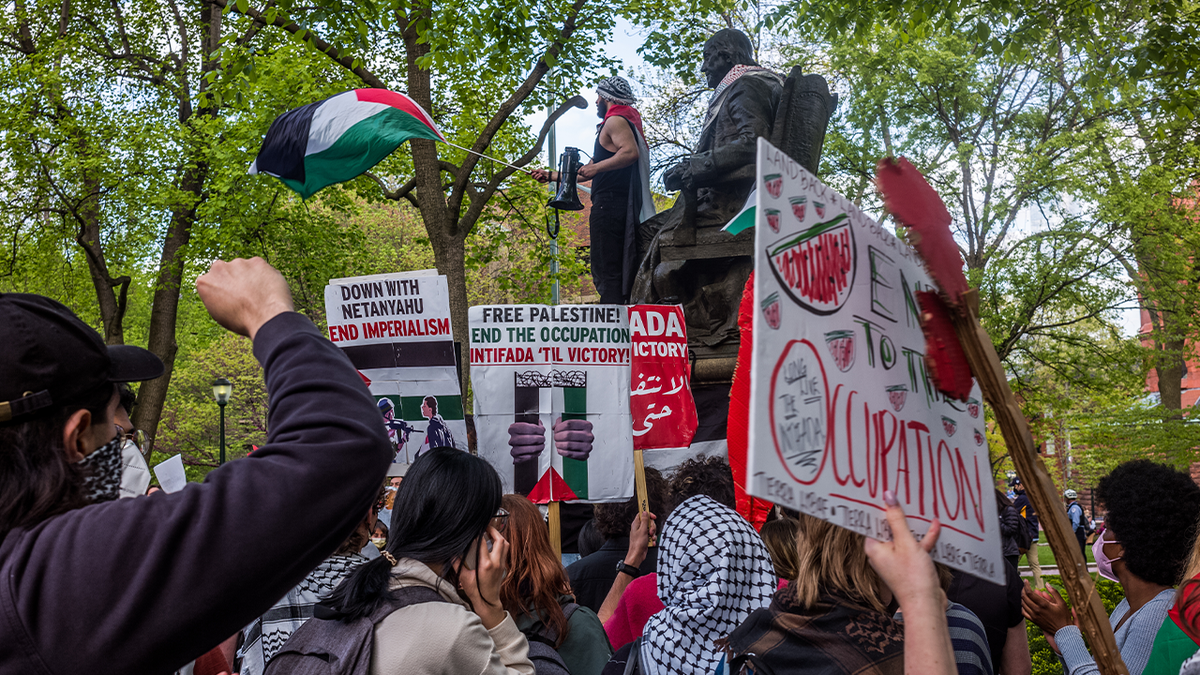
Pro-Palestinian protestors stage an encampment at the University of Pennsylvania in Philadelphia, Pennsylvania, United States April 25, 2024. (Getty Images)
Campus police, along with assistance from the Philadelphia Police Department, escorted the protesters from the campus building.
In an 11 p.m. update, authorities said that the protesters had dispersed.
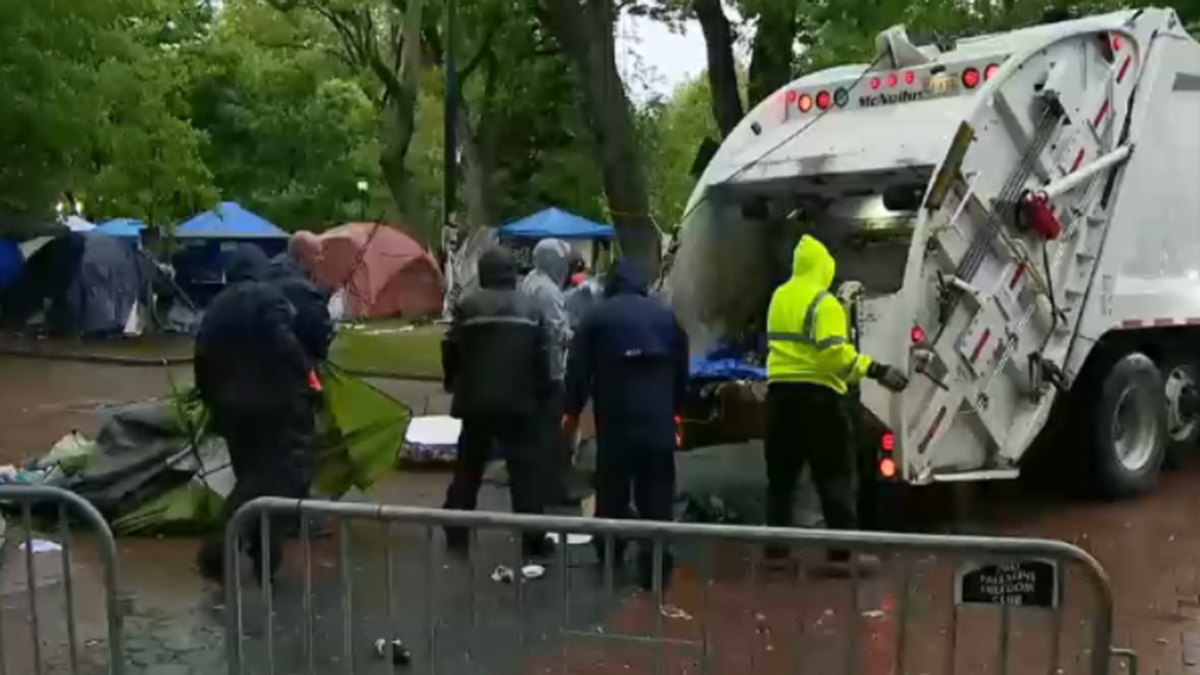
An anti-Israel encampment is removed Friday at the University of Pennsylvania campus in Philadelphia. (WTXF)
The occupation came one week after police dismantled an encampment that had taken over part of the Ivy League’s campus for two weeks.
In a statement, members of the Penn Gaza Solidarity Encampment accused the University of Penn administration of not negotiating with them in good faith over “Penn’s investment with Israel.”
World News
Being Muslim in Modi’s India

It is a lonely feeling to know that your country’s leaders do not want you. To be vilified because you are a Muslim in what is now a largely Hindu-first India.
It colors everything. Friends, dear for decades, change. Neighbors hold back from neighborly gestures — no longer joining in celebrations, or knocking to inquire in moments of pain.
“It is a lifeless life,” said Ziya Us Salam, a writer who lives on the outskirts of Delhi with his wife, Uzma Ausaf, and their four daughters.
When he was a film critic for one of India’s main newspapers, Mr. Salam, 53, used to fill his time with cinema, art, music. Workdays ended with riding on the back of an older friend’s motorcycle to a favorite food stall for long chats. His wife, a fellow journalist, wrote about life, food and fashion.
Now, Mr. Salam’s routine is reduced to office and home, his thoughts occupied by heavier concerns. The constant ethnic profiling because he is “visibly Muslim” — by the bank teller, by the parking lot attendant, by fellow passengers on the train — is wearying, he said. Family conversations are darker, with both parents focused on raising their daughters in a country that increasingly questions or even tries to erase the markers of Muslims’ identity — how they dress, what they eat, even their Indianness altogether.
One of them, an impressive student-athlete, struggled so much that she needed counseling and missed months of school. The family often debates whether to stay in their mixed Hindu-Muslim neighborhood in Noida, just outside Delhi. Mariam, their oldest daughter, who is a graduate student, leans toward compromise, anything to make life bearable. She wants to move.
Anywhere but a Muslim area might be difficult. Real estate agents often ask outright if families are Muslim; landlords are reluctant to rent to them.
“I have started taking it in stride,” Mariam said.
“I refuse to,” Mr. Salam shot back. He is old enough to remember when coexistence was largely the norm in an enormously diverse India, and he does not want to add to the country’s increasing segregation.
But he is also pragmatic. He wishes Mariam would move abroad, at least while the country is like this.
Mr. Salam clings to the hope that India is in a passing phase.
Prime Minister Narendra Modi, however, is playing a long game.
His rise to national power in 2014, on a promise of rapid development, swept a decades-old Hindu nationalist movement from the margins of Indian politics firmly to the center. He has since chipped away at the secular framework and robust democracy that had long held India together despite its sometimes explosive religious and caste divisions.
Right-wing organizations began using the enormous power around Mr. Modi as a shield to try to reshape Indian society. Their members provoked sectarian clashes as the government looked away, with officials showing up later to raze Muslim homes and round up Muslim men. Emboldened vigilante groups lynched Muslims they accused of smuggling beef (cows are sacred to many Hindus). Top leaders in Mr. Modi’s party openly celebrated Hindus who committed crimes against Muslims.
On large sections of broadcast media, but particularly on social media, bigotry coursed unchecked. WhatsApp groups spread conspiracy theories about Muslim men luring Hindu women for religious conversion, or even about Muslims spitting in restaurant food. While Mr. Modi and his party officials reject claims of discrimination by pointing to welfare programs that cover Indians equally, Mr. Modi himself is now repeating anti-Muslim tropes in the election that ends early next month. He has targeted India’s 200 million Muslims more directly than ever, calling them “infiltrators” and insinuating that they have too many children.
This creeping Islamophobia is now the dominant theme of Mr. Salam’s writings. Cinema and music, life’s pleasures, feel smaller now. In one book, he chronicled the lynchings of Muslim men. In a recent follow-up, he described how India’s Muslims feel “orphaned” in their homeland.
“If I don’t pick up issues of import, and limit my energies to cinema and literature, then I won’t be able to look at myself in the mirror,” he said. “What would I tell my kids tomorrow — when my grandchildren ask me what were you doing when there was an existential crisis?”
As a child, Mr. Salam lived on a mixed street of Hindus, Sikhs and Muslims in Delhi. When the afternoon sun would grow hot, the children would move their games under the trees in the yard of a Hindu temple. The priest would come with water for all.
“I was like any other kid for him,” Mr. Salam recalled.
Those memories are one reason Mr. Salam maintains a stubborn optimism that India can restore its secular fabric. Another is that Mr. Modi’s Hindu nationalism, while sweeping large parts of the country, has been resisted by several states in the country’s more prosperous south.
Family conversations among Muslims there are very different: about college degrees, job promotions, life plans — the usual aspirations.
In the state of Tamil Nadu, often-bickering political parties are united in protecting secularism and in focusing on economic well-being. Its chief minister, M.K. Stalin, is a declared atheist.
Jan Mohammed, who lives with his family of five in Chennai, the state capital, said neighbors joined in each other’s religious celebrations. In rural areas, there is a tradition: When one community finishes building a place of worship, villagers of other faiths arrive with gifts of fruits, vegetables and flowers and stay for a meal.
“More than accommodation, there is understanding,” Mr. Mohammed said.
His family is full of overachievers — the norm in their educated state. Mr. Mohammed, with a master’s degree, is in the construction business. His wife, Rukhsana, who has an economics degree, started an online clothing business after the children grew up. One daughter, Maimoona Bushra, has two master’s degrees and now teaches at a local college as she prepares for her wedding. The youngest, Hafsa Lubna, has a master’s in commerce and within two years went from an intern at a local company to a manager of 20.
Two of the daughters had planned to continue on to Ph.D’s. The only worry was that potential grooms would be intimidated.
“The proposals go down,” Ms. Rukhsana joked.
A thousand miles north, in Delhi, Mr. Salam’s family lives in what feels like another country. A place where prejudice has become so routine that even a friendship of 26 years can be sundered as a result.
Mr. Salam had nicknamed a former editor “human mountain” for his large stature. When they rode on the editor’s motorcycle after work in the Delhi winter, he shielded Mr. Salam from the wind.
They were together often; when his friend got his driver’s license, Mr. Salam was there with him.
“I would go to my prayer every day, and he would go to the temple every day,” Mr. Salam said. “And I used to respect him for that.”
A few years ago, things began to change. The WhatsApp messages came first.
The editor started forwarding to Mr. Salam some staples of anti-Muslim misinformation: for example, that Muslims will rule India in 20 years because their women give birth every year and their men are allowed four wives.
“Initially, I said, ‘Why do you want to get into all this?’ I thought he was just an old man who was getting all these and forwarding,” Mr. Salam said. “I give him the benefit of doubt.”
The breaking point came two years ago, when Yogi Adityanath, a Modi protégé, was re-elected as the leader of Uttar Pradesh, the populous state adjoining Delhi where the Salam family lives. Mr. Adityanath, more overtly belligerent than Mr. Modi toward Muslims, governs in the saffron robe of a Hindu monk, frequently greeting large crowds of Hindu pilgrims with flowers, while cracking down on public displays of Muslim faith.
On the day of the vote counting, the friend kept calling Mr. Salam, rejoicing at Mr. Adityanath’s lead. Just days earlier, the friend had been complaining about rising unemployment and his son’s struggle to find a job during Mr. Adityanath’s first term.
“I said, ‘You have been so happy since morning, what do you gain?’” he recalled asking the friend.
“Yogi ended namaz,” the friend responded, referring to Muslim prayer on Fridays that often spills into the streets.
“That was the day I said goodbye,” Mr. Salam said, “and he hasn’t come back into my life after that.”
World News
12 arrested at UC Berkeley after abandoned building takeover
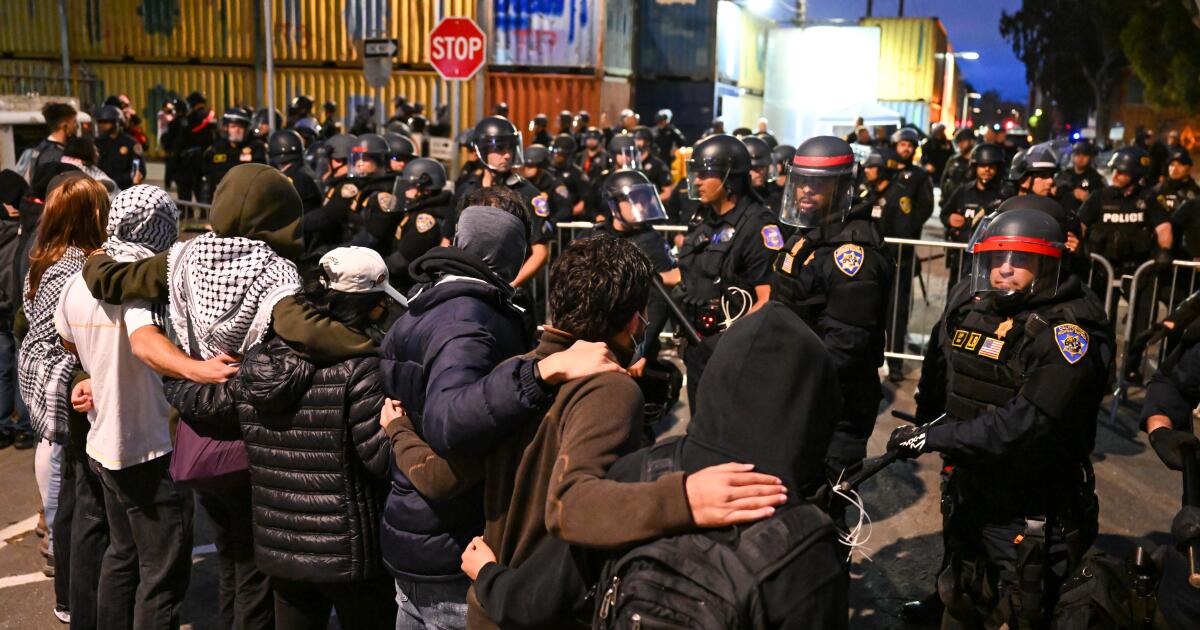
Even after UC Berkeley officials struck a deal with student leaders of the university’s longstanding pro-Palestinian encampment, a group of protesters took over an abandoned building on campus Wednesday, and some were later arrested.
The protesters occupied Anna Head Alumnae Hall, a condemned building on campus that they unofficially renamed for a Palestinian child killed this year during Israeli military operations in Gaza. The building takeover began Wednesday, one day after demonstrators removed their tents from one of the nation’s longest and largest encampments following an agreement with university officials.
About 24 hours after the group occupied the building — dropping banners and Palestinian flags from windows and pitching tents outside — police in riot gear from almost 20 agencies moved in late Thursday night and forced the demonstrators out.
There were 12 people arrested, one of whom was an enrolled student, UC Berkeley spokesperson Dan Mogulof said in a statement.
He said the standoff between officers and the protesters became violent when demonstrators blocked the hall’s entrance with plywood and shields while some used crowbars to hit officers and resist being arrested. No officers were injured because they were wearing helmets, he said. The Times wasn’t able to independently confirm if crowbars were used to hit officers.
It wasn’t immediately clear if any of those arrested were injured.
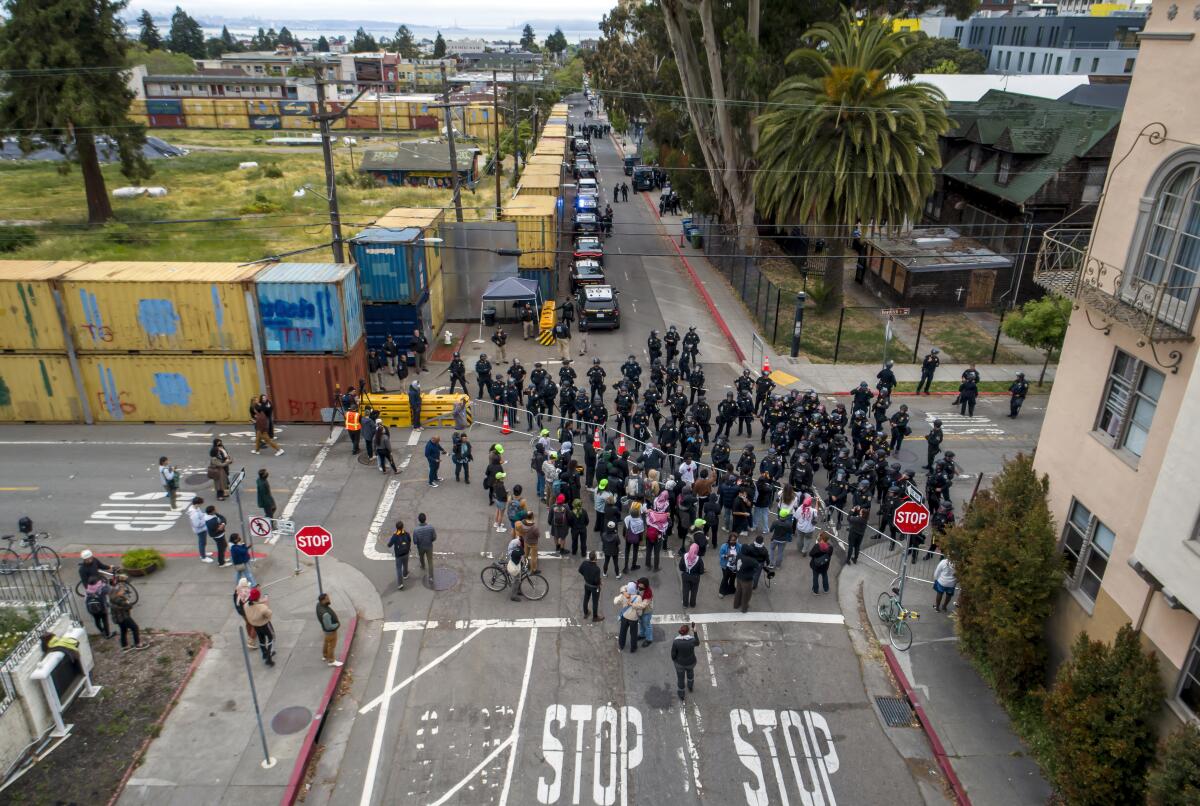
Local police and California Highway Patrol officers keep demonstrators away with barricades in Berkeley.
(Carlos Avila Gonzalez / San Francisco Chronicle)
All 12 were booked on suspicion of burglary, vandalism and conspiracy, Mogulof said. He said additional charges may be added as the University of California Police Department investigates and reviews video.
The protest action Wednesday coincided with the 76th anniversary of the Nakba, Arabic for “catastrophe,” which refers to the estimated 700,000 Palestinians who fled or were forced from their homes during the 1948 war surrounding Israel’s creation.
Many students at UC Irvine similarly commemorated the day’s history with a building takeover.
A large group there surrounded and barricaded a physical sciences hall Wednesday, but police moved in much sooner and arrested 47 people after forcing the group off campus and taking down their encampment. Administrators at UCI have not reached an agreement with student protesters as officials have at Berkeley.
There, university officials almost immediately called the building takeover, as it was playing out, “an active crime scene.”
“It is not nonviolent civil disobedience,” Mogulof said, adding that protesters were “vandalizing an unsafe, boarded-up, fire-damaged building.”
University officials tried to draw a distinction between the protesters with whom administrators reached an agreement Tuesday and the group who took over the abandoned building Wednesday.
As part of the Berkeley agreement reached Tuesday, Chancellor Carol Christ said she would initiate a discussion about the university’s investments in weapons companies and the possible divestment from them as well as issue a letter calling for an immediate cease-fire in Gaza. The move aligned the university with at least four others in the state and several across the country that have forged settlements with activists to end campus encampments that some Jewish students say have included antisemitic signage and chants.
But at least one Pro-Palestinian student group pushed back on the university’s distinction between protest groups this week.
In a “statement of solidarity” with the group occupying the abandoned hall, which they’d renamed “Hind’s House” in honor of Hind Rajab, a 6-year-old Palestinian girl who was killed during Israeli attacks in Gaza in January, the UC Berkeley Graduate Students for Justice in Palestine shared a statement during the protest saying they “reject and condemn the attempts to … fragment and divide our movement for Palestine.”
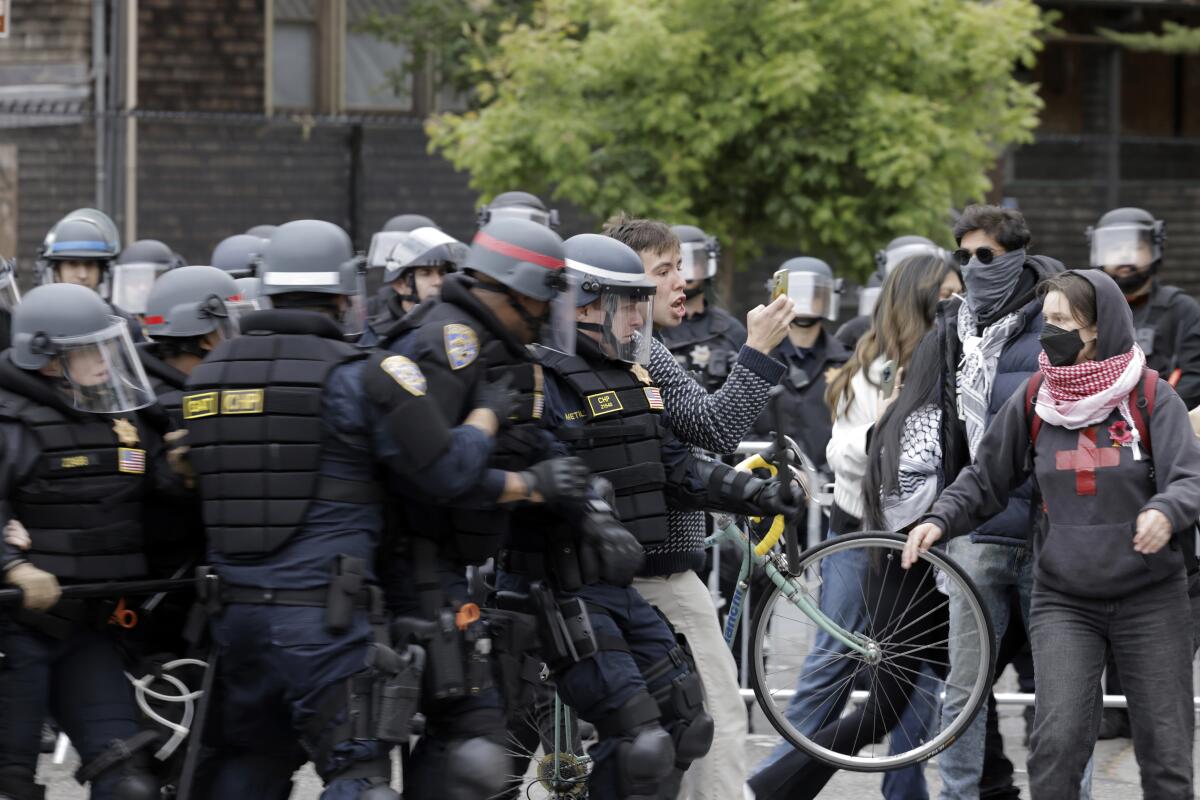
Law enforcement officials encounter protesters as officers move in to remove demonstrators inside UC Berkeley’s Anna Head Alumnae Hall.
(Carlos Avila Gonzalez / San Francisco Chronicle)
“We reject the ‘good protester’ vs ‘bad protestor’ and ‘inside’ and ‘outside’ dichtomy,” the post said, calling on the university’s administration to avoid responding to the occupation with police.
Hours later, dozens of officers in helmets faced off with the protesters, according to photos and video from the scene.
The arrests at Berkeley weren’t the only police investigations in the Bay Area this week.
In Oakland, at the University of California’s president’s office, officials are investigating recent vandalism and property damage for which a Pro-Palestinian group appears to have taken credit.
On Sunday, Oakland police officers responded to the building just after midnight, where they found broken windows and paint on the walls, Oakland police spokesperson Paul Chambers said. He said it’s being investigated as a hate-related incident.
Ryan King, a spokesperson for the UC office of the president, confirmed that the building was tagged with graffiti and had other damage. He declined to comment on a motive behind the attack.
An anonymous Bay Area blog post on Tuesday took credit for the vandalism, saying it was done in “in solidarity with the Palestinian Resistance.”
-

 African History4 months ago
African History4 months agoBlack History Facts I had to Learn on My Own pt.6 📜
-

 African History4 years ago
African History4 years agoA Closer Look: Afro-Mexicans 🇲🇽
-

 African History1 year ago
African History1 year agoPROOF AFRICAN AMERICANS AIN'T FROM AFRICA DOCUMENTED EVIDENCE
-

 African History2 years ago
African History2 years agoHow Did Normal Medieval People Survive Winter? | Tudor Monastery Farm | Chronicle
-

 African History3 years ago
African History3 years agoThe Entire History of Africa in Under 10 Minutes – Documentary
-

 African History4 years ago
African History4 years agoA Closer Look: Afro-Mexicans 🇲🇽
-

 African History3 years ago
African History3 years agoWhat happened to the many African Kingdoms? History of Africa 1500-1800 Documentary 1/6
-

 African History1 year ago
African History1 year agoA Black African King in Medieval European Art































